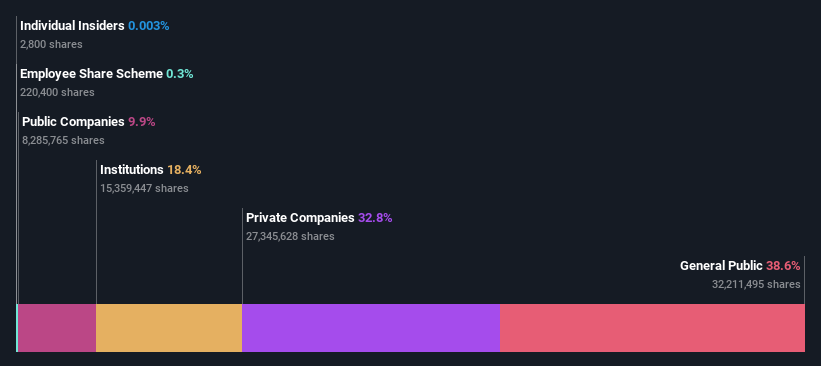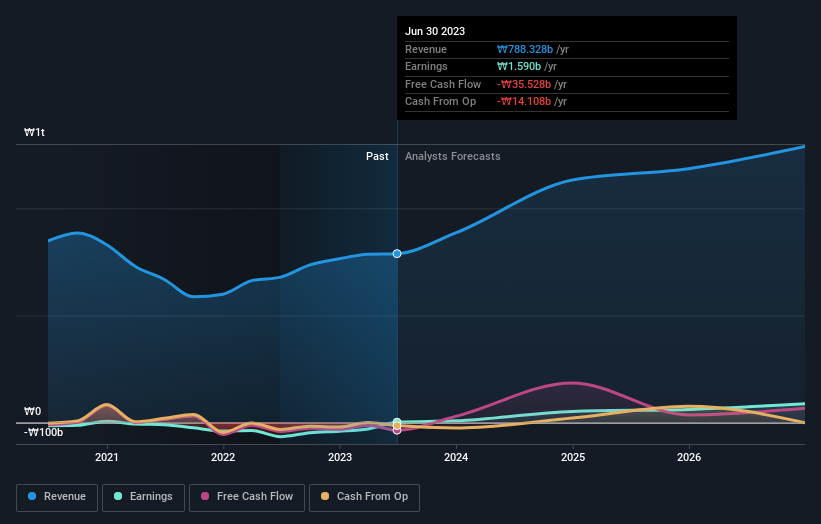- South Korea
- /
- Machinery
- /
- KOSE:A082740
Individual investors in Hanwha Engine Co., Ltd. (KRX:082740) are its biggest bettors, and their bets paid off as stock gained 9.2% last week

Key Insights
- The considerable ownership by individual investors in Hanwha Engine indicates that they collectively have a greater say in management and business strategy
- A total of 3 investors have a majority stake in the company with 56% ownership
- 18% of Hanwha Engine is held by Institutions
A look at the shareholders of Hanwha Engine Co., Ltd. (KRX:082740) can tell us which group is most powerful. The group holding the most number of shares in the company, around 39% to be precise, is individual investors. Put another way, the group faces the maximum upside potential (or downside risk).
As a result, individual investors collectively scored the highest last week as the company hit ₩1.1t market cap following a 9.2% gain in the stock.
Let's take a closer look to see what the different types of shareholders can tell us about Hanwha Engine.
See our latest analysis for Hanwha Engine

What Does The Institutional Ownership Tell Us About Hanwha Engine?
Institutional investors commonly compare their own returns to the returns of a commonly followed index. So they generally do consider buying larger companies that are included in the relevant benchmark index.
As you can see, institutional investors have a fair amount of stake in Hanwha Engine. This can indicate that the company has a certain degree of credibility in the investment community. However, it is best to be wary of relying on the supposed validation that comes with institutional investors. They too, get it wrong sometimes. When multiple institutions own a stock, there's always a risk that they are in a 'crowded trade'. When such a trade goes wrong, multiple parties may compete to sell stock fast. This risk is higher in a company without a history of growth. You can see Hanwha Engine's historic earnings and revenue below, but keep in mind there's always more to the story.

We note that hedge funds don't have a meaningful investment in Hanwha Engine. The company's largest shareholder is Hanwha Impact Global Co., Ltd, with ownership of 33%. For context, the second largest shareholder holds about 13% of the shares outstanding, followed by an ownership of 9.9% by the third-largest shareholder.
A more detailed study of the shareholder registry showed us that 3 of the top shareholders have a considerable amount of ownership in the company, via their 56% stake.
Researching institutional ownership is a good way to gauge and filter a stock's expected performance. The same can be achieved by studying analyst sentiments. There are plenty of analysts covering the stock, so it might be worth seeing what they are forecasting, too.
Insider Ownership Of Hanwha Engine
While the precise definition of an insider can be subjective, almost everyone considers board members to be insiders. The company management answer to the board and the latter should represent the interests of shareholders. Notably, sometimes top-level managers are on the board themselves.
Most consider insider ownership a positive because it can indicate the board is well aligned with other shareholders. However, on some occasions too much power is concentrated within this group.
Our data suggests that insiders own under 1% of Hanwha Engine Co., Ltd. in their own names. We do note, however, it is possible insiders have an indirect interest through a private company or other corporate structure. It seems the board members have no more than ₩38m worth of shares in the ₩1.1t company. Many investors in smaller companies prefer to see the board more heavily invested. You can click here to see if those insiders have been buying or selling.
General Public Ownership
With a 39% ownership, the general public, mostly comprising of individual investors, have some degree of sway over Hanwha Engine. While this group can't necessarily call the shots, it can certainly have a real influence on how the company is run.
Private Company Ownership
Our data indicates that Private Companies hold 33%, of the company's shares. It's hard to draw any conclusions from this fact alone, so its worth looking into who owns those private companies. Sometimes insiders or other related parties have an interest in shares in a public company through a separate private company.
Public Company Ownership
We can see that public companies hold 9.9% of the Hanwha Engine shares on issue. This may be a strategic interest and the two companies may have related business interests. It could be that they have de-merged. This holding is probably worth investigating further.
Next Steps:
It's always worth thinking about the different groups who own shares in a company. But to understand Hanwha Engine better, we need to consider many other factors. Take risks for example - Hanwha Engine has 4 warning signs (and 1 which shouldn't be ignored) we think you should know about.
If you are like me, you may want to think about whether this company will grow or shrink. Luckily, you can check this free report showing analyst forecasts for its future.
NB: Figures in this article are calculated using data from the last twelve months, which refer to the 12-month period ending on the last date of the month the financial statement is dated. This may not be consistent with full year annual report figures.
Valuation is complex, but we're here to simplify it.
Discover if Hanwha Engine might be undervalued or overvalued with our detailed analysis, featuring fair value estimates, potential risks, dividends, insider trades, and its financial condition.
Access Free AnalysisHave feedback on this article? Concerned about the content? Get in touch with us directly. Alternatively, email editorial-team (at) simplywallst.com.
This article by Simply Wall St is general in nature. We provide commentary based on historical data and analyst forecasts only using an unbiased methodology and our articles are not intended to be financial advice. It does not constitute a recommendation to buy or sell any stock, and does not take account of your objectives, or your financial situation. We aim to bring you long-term focused analysis driven by fundamental data. Note that our analysis may not factor in the latest price-sensitive company announcements or qualitative material. Simply Wall St has no position in any stocks mentioned.
About KOSE:A082740
Reasonable growth potential slight.


